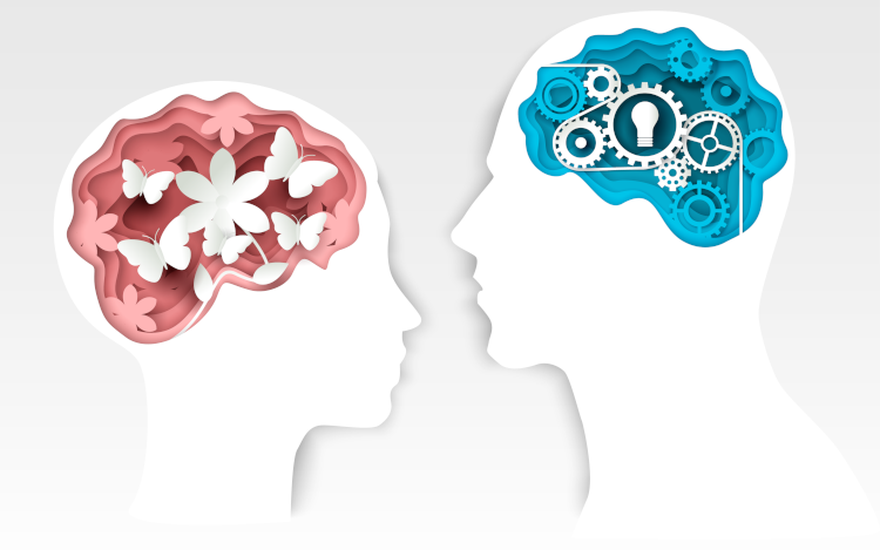
Invisible Pieces: Women in Chess
Women don't play chess, and when they do, they play badly.
Chess is experiencing a renewed surge of interest thanks in part to The Queen's Gambit, a Netflix show exploring a young American woman's rise to world champion. It's a great show, and it also manages to neatly sidestep any real sociological commentary on what it means for Beth Harmon to be female in this world. However, back in the real world, as a woman involved heavily in the chess scene, the gender politics are much more difficult to ignore.
It's hard to be specific about the number of active female players, but most estimates fall somewhere between 5-15%. Hou Yifan is the only woman in the FIDE top 100, coming in at number 86. Judit Polgar, the highest-ranked female player of all time, was number eight back in 2005. There's never been a female world champion.
This begs an awkward question - in a game that relies on mental agility and not physical strength, why is there such a significant gender gap in chess rankings? If women really are equal to men, why is that not reflected in those rankings?
Biological essentialists attempt an answer to this question by claiming that women are fundamentally unable to play chess to the same standard as men. There is something wrong with our brains. Bobby Fischer, one of the greatest chess players of all time, certainly felt this way. He claimed that women were 'stupid' compared to men, and played chess 'like beginners'. Biological essentialists tend to believe that the women who do manage to break through to the upper echelons of chess are anomalies, rather than proof of female capability.
A lost interview with Bobby Fischer has resurfaced and it's remarkable. https://t.co/D63YIw7LEC pic.twitter.com/kWmrg8wLNf
--- Olimpiu G. Urcan (@olimpiuurcan) March 1, 2018
At first glance, biological essentialism seems to make sense in a world that at least pretends to provide equal opportunities for men and women. There is also the obvious truth that men and women do have observable neurological differences: the male brain tends to weigh 10% more than the female brain, although there is no evidence that this impacts intelligence.
The phrase 'no evidence' is going to be repeated a lot in this section. In short, there is absolutely no evidence for biologically different skillsets between men and women. An adult brain is soaked in the culture that it was raised in, and we constantly see examples of interplay between biology and culture. A study conducted by Coutrot et al. (2018) investigated the differences in navigational skills according to gender, and concluded that the worse a country's gender equality index, the greater gendered difference in navigational skills. Far from being a static lump of meat, stamped male or female, the brain's pathways are shaped by experience - it's constantly evolving, changing its capacities.
In her book The Gendered Brain, Gina Rippon unpacks the myth of differences between male and female brains. Beyond the 'missing five ounces', modern neuroscientists have been unable to find any conclusive or defining differences in structure or functionality between men and women. Instead, she explains that a 'gendered world' will produce 'gendered brains'. In its rawest form, the brain is no more gendered than the lungs, or the liver: it is the world we're born into that turns our grey matter blue or pink. It's also worth pointing out that the weight of all organs are on a spectrum, and no one suggests that heavier noses make one better at smelling. Why apply the same specious reasoning to the brain?
Biological essentialism is dead in the water. It serves only to create fantasies of male superiority. So, now that it's been firmly established that there are no neurological differences that can account for the lack of female world champions, what else is there? What's left is a cocktail of sociological and statistical factors.
One story alone should force essentialists to question their position. László Polgár had three daughters and created three chess prodigies: a 100% success rate. Judit Polgar was, at the height of her game, number eight in the world. László's premise was simple: any child, as long as they started studying before four years old, and specialised their subject by six, could become a genius in their chosen field. The question of the morality of forcing children into a lifetime of chess notwithstanding, the Polgar story is a compelling anecdote, proving that when girls are given strong opportunities, equal access to support, and an environment in which their success is not aberrational, they are perfectly capable on the board.
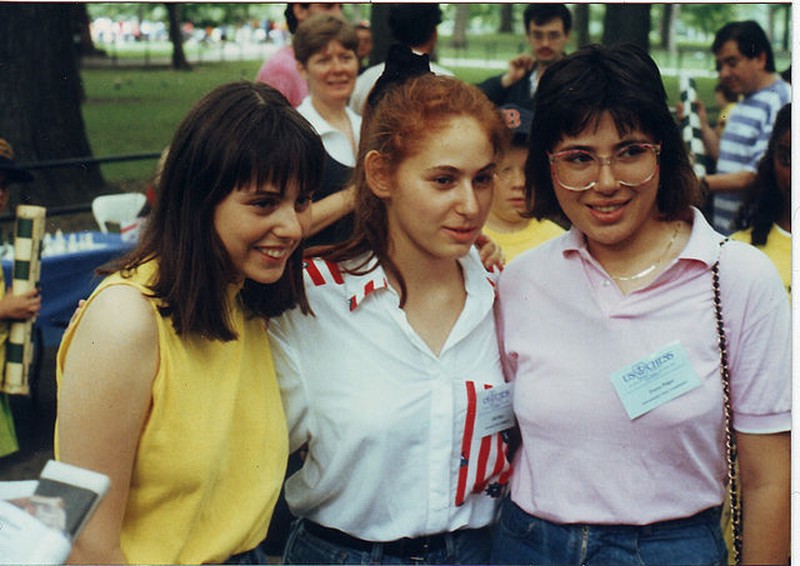
The three Polgar sisters (Wikimedia Commons)
There are very few people - male or female - who receive the same encouragement as the Polgar sisters. Ira Tolchin Immergluck, a journalist, refers to her own experience playing chess as a young woman in Russia. She says that for the first time in her life, she felt 'true joy' when playing chess, that for a while chess was all she and her friends talked about, that there were moments of pure 'elation'. However, her parents weren't as enthusiastic: they 'shunted' her towards piano. Her experience is only one example, but one imagines that this scenario is played out constantly. Even with equal ability to learn chess to a high standard, it makes no difference if girls do not get the opportunity. Chess is still considered by many to be a 'boy thing', and girls quite simply are not given the space required to hone their skills.
It's not just lack of encouragement, though. It's time. It's priorities. It's well-established that women do the bulk of the housework, for example. A 2016 analysis carried out by the UK Office for National Statistics finds that women carry out 60% more unpaid work. A 2019 study led by McMunn reached similar conclusions: women performed 16 hours of unpaid labour per week, and men only performed six. In 93% of couples surveyed, women did the majority of the work. The gap remains even when women are employed more gainfully than their husbands: a 2014 study led by Besen-Cassino concludes that the more a woman earns, the less housework her husband does.
This gap in unpaid labour starts early. Lam et al. (2016) discovered that young girls do more chores than young boys, and when mothers spent longer hours away from the home, the girls took on most of the extra work. UNICEF reports that girls, on average, perform 40% more chores. It's clear to see the disadvantage girls and women are at, here. A disproportionate lack of free time will obviously contribute to lower chess achievement.
With regard to the lack of achievement, a 2008 study led by Merim Bilalić makes reference to biological essentialism as a 'popular explanation for the small number of women at the top level of intellectually demanding activities'. However, they unequivocally state that there is, 'in reality, very little performance gap in favour of men for non-statistical theories to explain.' There is a logical fallacy in concluding that gendered differences in the top players is biological. In short, the study concludes that 'the great discrepancy in the top performance of male and female chess players can be largely attributed to a simple statistical fact---more extreme values are found in larger populations.' That is to say that the more people in a group, the more likely it is that people within that group will be anomalous in some way. The fact that roughly 90% of players are men means that there is naturally more deviation in their numbers. It's a numbers game, not a question of male superiority.
Stereotype threat - the concern that one might be the target of negative stereotypes - is another potential contributor to the lack of female chess success. In a study conducted by Maass et al. (2008), when women falsely believed that they were playing other women, they won roughly 50% of the time. Maass notes that the performance drop was 'remarkable' when reminded of gender chess stereotypes, and when they knew their opponent was male. Most interesting of all was the finding that women performed more poorly against the same opponent when they knew that they were playing a man, compared to when they were told they were playing a woman.
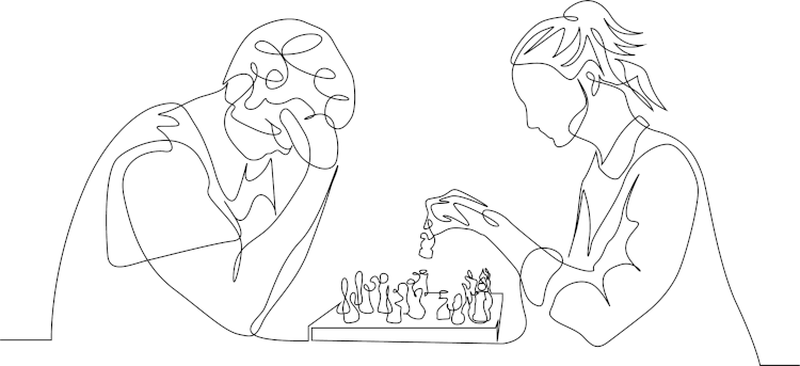
Women, particularly those who spend a lot of time online, reading chess news, or interacting with the wider community, experience near-constant stereotyping. Anyone who has spent five minutes on chess forums knows that questions pertaining to gendered differences in skill levels come up with alarming frequency, and that women are treated with visible contempt. It seems obvious that an environment in which women are rarely afforded much respect, would affect a woman's ability, motivation, and desire to perform to her highest standard.
Women don't just hear about their own shortcomings from anonymous internet users, however. They also hear it from high-ranking professionals. Eva Repková heads the commission for women's chess at the International Chess Federation (FIDE), and even she believes that women are 'naturally' disadvantaged in chess, suggesting that girls are more naturally suited to 'flower arranging'. How are girls supposed to be inspired by a woman who quite clearly doesn't believe in them? It's an astounding mismatch of profession and person, and speaks volumes about how deeply ingrained the anti-woman sentiment is in chess culture. It is unsurprising to hear this kind of thing from men; from other women, it is a total betrayal.
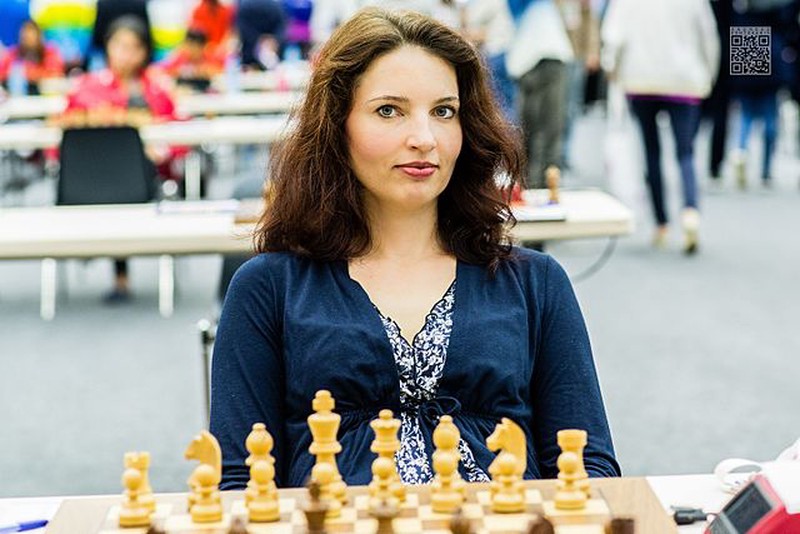
Eva Repkova (Wikimedia Commons)
Nigel Short is an English Grandmaster, as well as a vice president of FIDE. In 2015 he asserted that women are 'hardwired' to be worse at chess than men, explaining that the issue is not that women are less intelligent, just different. He posits that his wife is better at emotionality, and he is better at cars. Nigel Short, who left school at seventeen to focus full-time on chess, has zero qualifications in the field of neuroscience. Although he seems to believe otherwise, mastery of chess does not transfer to any other sphere, especially not one as complex as the brain. He has absolutely no authority on the subject, and for him to pretend otherwise is peak charlatanism.
Short and Repková's claims of some kind of inherently gendered neurological skillset have been specifically referred to by Gina Rippon as simply a reframing of the argument that women are less intelligent than men. It is just another way to dismiss women attempting to break out of their socially-prescribed roles. There is, again, absolutely no evidence that male and female brains have different skillsets - nothing to suggest that women are inherently better at emotionality, or flower arranging, or sociology, and no evidence to suggest that men are inherently better at engineering, or maths, or physics. It is deeply embarrassing that 'leaders' of the chess community continue to cling to archaic, unscientific ideas that would seem at home in the 1950s.
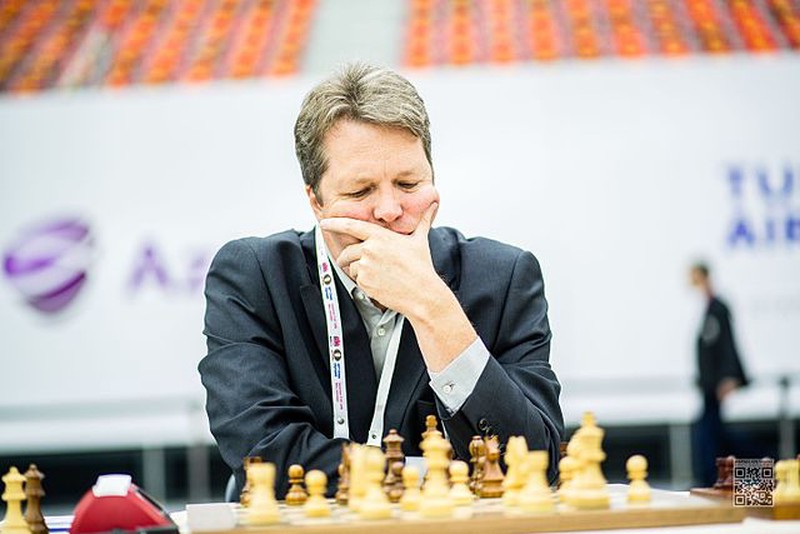
Nigel Short (Wikimedia Commons)
The willingness to treat women as commodities trickles down from FIDE into the online chess community. The streamer QTCinderella has spoken at length about her terrible experience during the Pogchamps tournament, calling out the sexism and toxicity of chess culture. She stated that her looks were a topic of conversation in a way that was never an issue for the male participants, and she had a complaint filed against her on chess.com for being 'crude', despite the fact that her jokes were, if anything, less crude than the male players.
Alexandra Botez, one of the pre-eminent female chess streamers, has also spoken out about the sexism she's received, stating that 'predatory behaviour has been normalised', explaining that because of the dearth of female players, many men go on the 'hunt' for women and girls. Chess men, Botez says, are perfectly willing to use their age and position to take advantage of the girls they encounter, recounting her own experience when she, fourteen and drunk, was preyed upon by a man in his twenties.
It seems obvious to me that in a deeply male-dominated environment, women and girls will be at a disadvantage in terms of personal safety. However, there also seems to be a blind spot, here, for a lot of otherwise good, kind men, in that they seem to think that experiencing sexism is unusual. This is not true. Chess culture is steeped in it. Every single woman I spoke to had stories to tell me about being discounted, about being stalked, about being consistently and unremittingly considered less worthy than their male counterparts. This is the norm, and to pretend otherwise compounds the problem.
The tendency for some men to react with angry disbelief when they lose to a woman illustrates perfectly the lack of respect afforded to us. In 2008, Ilmars Starostits, a Latvian Grandmaster, accused Anna Rudolf, a Hungarian IM, of receiving transmissions to her lip balm tube. Such an accusation is so patently ridiculous that it ought not to be validated at all, but Rudolf was still compelled to make a statement to chessdom.com proclaiming her innocence. Which is more unbelievable, here: that a woman is receiving secret transmissions to a lip balm tube, or that she simply outclassed the other players on that occasion? The fact that many people thought the former is astounding.
A titled friend of mine showed me a conversation that she'd had with a man she'd beaten, during which he claimed that he had 'never before lost to a woman', 'women can't beat [him],' and boasted of how many female Grandmasters he had beaten over the board. He could not conceive of a woman beating him. We both thought that, actually, he had meant it as a compliment, but a tip for any men reading this: neither of us thought the comment complimentary. The implication that good female players are a deviation from the norm - that being a woman is an inevitable handicap - is simply not a compliment.
This same friend, when I told her I was looking for female players to talk to for this piece, reacted with intense skepticism. In the end, she was right; it took four months to gather enough women willing to talk to me, and none of them wanted to be named.
Another friend referred to a strange kind of dynamic that I've experienced myself: treating female players as 'unicorns'. The name itself implies something mythically rare, magical, non-existent - and we agreed that at first, it's kind of fun! It's flattering! You receive adulation for simply being yourself! Who wouldn't find that entertaining?
It doesn't stay entertaining. One of her male associates ended up stalking her obsessively. She also grew tired of feeling constantly watched by other male players. As a result, she has changed her username from something overtly female to something more gender-neutral. When I suggested that, in the end, treating female players as 'unicorns' is nothing more than a fancy form of othering, she said 'EXACTLY!'
And as for me? I've been in discord servers where chess players have openly posted softcore pornography. (Only of girls, of course.) I don't think there was even any malice in this: I think that women are so secondary in the chess community that it would never occur to most men that a woman might be reading the chat in the first place. They would never consider that posting images of passive, sexualised women might create an environment in which we don't feel comfortable or welcome. It's difficult to criticise these people specifically, though, when the executives are doing the exact same things: David Llada, FIDE's Chief Marketing & Communications Officer, has a tumblr account on which he posts a fairly steady stream of beautiful half-naked women. He does the same on one of his twitter accounts. Both accounts use his real name and real face. There is no sense of secrecy, or privacy; he seems to have no problem associating his FIDE job with his penchant for soft pornography.
I suspect that he would defend these pictures on their artistic merit. There may be some truth to that. I would, however, question why the only women he seems to consider consistently artistically meritful are young, beautiful, thin, and naked. I think we all know the answer to that one.
I've had unsolicited requests for dating advice from people I barely know, simply by dint of being a woman. I've had strangers requesting my phone number - and giving me theirs. I've been assumed to be male more often than I can count, and I've been accused of lying about my own gender for the 'clout'. (What clout are they imagining?) I am nearly always the only woman in the room, and while I tolerate it, I understand why many women can't. It's an enormous level of responsibility to be forced to represent womanhood as a whole, and most women don't want it.
I've had to hold my tongue more times than I can count for fear of being immediately dismissed as nothing more than a social justice warrior feminist bitch. I find it difficult to trust the friends I do have in this community, because of the misogynistic and hateful behaviour I've seen in otherwise good men. Men have told me that my fears for my own safety are unrealistic and overblown, while the women have told me no, this is realistic, you are not paranoid, you are exactly right.
I've found the environment less overtly hostile over the board, but it's still far from easy. When I joined my local chess club, I was, as expected, the only woman present, and at least fifty years younger than the majority of them. The very first night I went - the very first interaction I had with any other club member - I was stopped by a man who looked to be about eighty. He told me loudly, while looking me up and down in that way that women are deeply familiar with, that he would 'like to play a game with [me]'. His tone left me in no doubt as to what kind of game he was referring to. His friend, who was equally ancient, burst out laughing, proclaiming that he would 'tell [the other man's] wife!'.
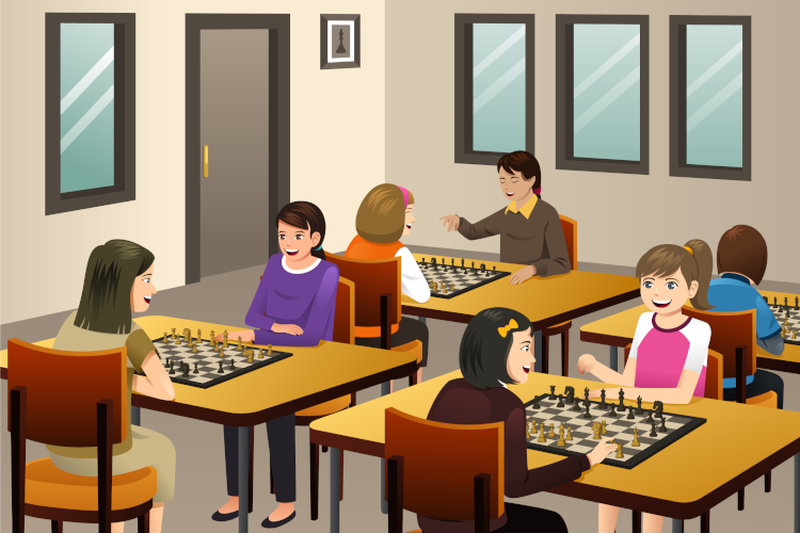
Spoiler: It was nothing like this.
This interaction set the tone for the club as a whole. Whenever I was playing, the men would find excuses to walk around the room, and - coincidentally, of course - end up around my table. This level of scrutiny did not seem to be applied to anyone else. I was treated as something of a novelty - the unicorn, again - and that gets tiresome very quickly. I was advised, repeatedly, on best play by a man I rarely lost to. He quite evidently was not in a position to teach me anything at all, yet persisted in attempting to explain to me a game at which I outplayed him.
I never feared for my safety there; the vast majority of the players looked as though they would have crumbled with a swift kick to the shins. Despite their inability to treat me as anything other than a curiosity, most of them seemed kind and genial, if socially awkward. The fact remains, however, that it is difficult to be the only woman in the room. It is vexing to be treated like an exhibit, rather than just another club member there for the same boring reason that everyone else was: to play chess.
It wears you down. I only lasted a few months.
I have often considered leaving the community entirely. The thing is, though, that I never do. For every conversation that makes me reconsider my faith in humanity, there are two more that reaffirm it. For every person who attempts to make me feel inferior, there is someone who spends hours with me, walking me through old games. This community does, at its centre, have good bones. Despite everything, I like it here.
This leads me to a paragraph I've had trouble with: anything approaching solutions. The community does have good bones, but it also has deep rot, and that rot starts at the top. How do we, as women, reconcile our position in chess, when the vice president of FIDE thinks that our brains are functionally incapable of playing chess on the same level that he is? When the head of the commission for women's chess believes that women are better suited for flower arranging than playing chess? I don't know the answer to that. Alexandra Botez has expressed the same sentiments: 'I'm encouraging more girls to get into a space that I know is nasty and toxic. Is that even the right thing to do?' I don't know the answer to that, either.
I do want to speak directly to the women reading this. I know that a lot of you will have been hiding behind gender-neutral usernames. I know that a lot of you will be reluctant to engage with the wider chess community. I know these things, because I have many friends who have told me this, and I have been there myself. And in response, I ask myself the question: if I am not open about being a woman, who does that serve? I suppose I wouldn't receive so many phone numbers, so in that way, it does serve me.
But I think, in reality, it mostly serves the people who don't believe that women can play chess. Who think that chess is still, at its core, something for men. I think there's value in being very visibly female. If nothing else, I think it makes female newcomers feel less alone, and less daunted by the wall of maleness in front of them.
Of course it's complicated, though, evidenced by the fact I'm writing this anonymously. I would quite genuinely fear for my safety if I wrote this under my username. That, in itself, is indicative of a huge problem, and I hope that if nothing else, you internalise the fact that I, and all the female chess players I've spoken to about this article, thought that there was a non-zero chance that I'd end up dead in a ditch if I used my name. It's very easy to dismiss this as baseless paranoia if you are not female, but I am a woman who grew up on the internet, and I know for a fact that it is not.
So what else is there? To the men reading, I would urge you to consider whether your own actions make the community a better or a worse place for women. I would ask you whether you, genuinely, despite what you'd say publicly, do think that women are inherently incapable, and then I would ask you to reflect honestly on your answer. Treat any women you encounter as fully-fledged human beings, because we are. We just want to play chess, same as you.
If any women reading this want to share your own stories with us, we at Lichess would love to hear them. And from me to you: keep playing. We deserve to experience the same support that Beth Harmon had. We shouldn't have to laugh at the ludicrousness of that idea. We are as much a part of this community as anyone else, and no one should make us feel otherwise.
Sources:
Fischer on women: https://allthatsinteresting.com/bobby-fischer
Gendered navigational skills: https://www.cell.com/current-biology/pdf/S0960-9822(18)30771-1.pdf
The Gendered Brain https://www.penguin.co.uk/books/111/1114075/the-gendered-brain/9781784706814.html
Women carry out more work https://www.ons.gov.uk/employmentandlabourmarket/peopleinwork/
earningsandworkinghours/articles/womenshouldertheresponsibilityofunpaidwork/2016-11-10
Girls spend more time on chores https://www.unicef.org/press-releases/girls-spend-160-million-more-hours-boys-doing-household-chores-everyday#:~:text=NEW%20YORK%2C%207%20October%2C%202016,the%20Girl%20on%2011%20October.
Chores through childhood https://psycnet.apa.org/record/2016-49292-001
Gender divisions of labour https://journals.sagepub.com/doi/10.1177/0950017019862153
Divisions of house chores https://riviste.unige.it/aboutgender/article/view/176
Statistical explanations for the lack of women at the top https://royalsocietypublishing.org/doi/full/10.1098/rspb.2008.1576
Gender stereotyping in chess https://onlinelibrary.wiley.com/doi/abs/10.1002/ejsp.440
Ira Tolchin Immergluck's story https://www.timesofisrael.com/my-own-queens-gambit-back-in-the-ussr/
Eva Repková interview https://www.livemint.com/mint-lounge/features/-it-s-more-natural-for-men-to-pick-chess-11601627735237.html
Anna Rudolf lipbalm cheating accusation https://www.nytimes.com/2008/01/13/crosswords/chess/13chess.html
Nigel Short on women https://www.telegraph.co.uk/culture/chess/11548840/Nigel-Short-Girls-just-dont-have-the-brains-to-play-chess.html
David Llada's tumblr https://davidllada.tumblr.com/
Botez on her sexual harrassment experiences https://www.youtube.com/watch?v=Vc6Zia-zYX8
QTCinderella on sexism in chess https://www.youtube.com/watch?v=IwL_KDVojZY&ab_channel=TwitchRoom
More blog posts by Lichess
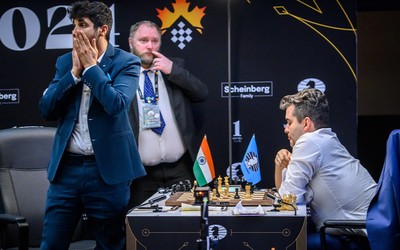
Candidates Round 11: Nepomniachtchi, Tan Back in Sole Lead
Nepomniachtchi and Tan lead alone once again, while Nakamura's win puts him in shared 2nd with Gukesh
Candidates Round 10: Nakamura and Caruana Bounce Back, Lei in Shared Lead
Nakamura and Caruana bounced back with wins against Abasov and Firouzja, respectively, while Lei bea…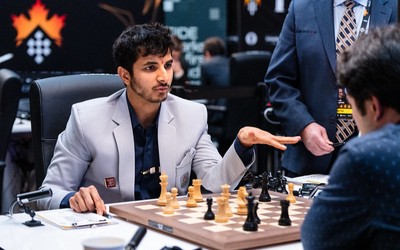
Candidates Round 9: Vidit and Tan Win As Tan Is Back in the Sole Lead
Vidit wins against Nakamura for the second time as the standings at the top of the Open remain uncha…
